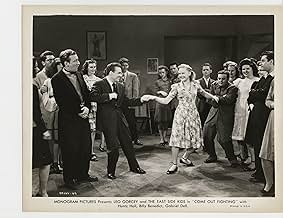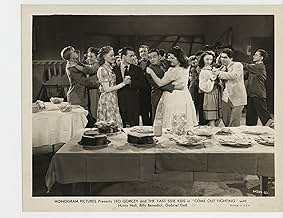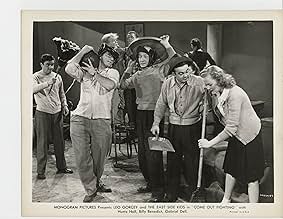Ajouter une intrigue dans votre langueThe police commissioner asks some local street kids to toughen up his sissy son.The police commissioner asks some local street kids to toughen up his sissy son.The police commissioner asks some local street kids to toughen up his sissy son.
Photos
William 'Billy' Benedict
- Skinny
- (as Billy Benedict)
Buddy Gorman
- Sammy
- (as Bud Gorman)
Fred Kelsey
- Mr. McGinnis, Sr.
- (as Fred Kelsy)
Histoire
Le saviez-vous
- AnecdotesShot in six days.
- ConnexionsFollows East Side Kids (1940)
Commentaire à la une
COME OUT FIGHTING (Monogram, 1945), a Banner production directed by William Beaudine, marks the 22nd and final installment to the "East Side Kids" comedy/dramas. Though its title gives indication of placing Muggs and Glimpy in combat duty in the comedic manner of Abbott and Costello's BUCK PRIVATES (1941), the plot reverts back to boxing theme and crooked gamblers. This time Mugs is the trainer rather than the boxer. Regardless of rehash plots lifted from earlier installments, COME OUT FIGHTING is an attempt in something original but not as striking as one would have preferred.
The story gets underway as Muggs McGinnis (Leo Gorcey) trains Danny Moore (Mende Koenig) for the upcoming interborough boxing tournament at their basement section of the East Side Club. The loud commotion being heard by Mrs. O'Toole upstairs has her complaining to Officer McGowan (Davison Clark) who padlocks the door, locking Muggs and his gang, Glimpy (Huntz Hall), Skinny (Billy Benedict), Pete Hallerman (Gabriel Dell), Sammy (Buddy Gorman) and Jane Riley (June Carlson), the only female member, outside the premises. As Muggs, accompanied by Glimpy, drives his father's pick-up truck to pay a visit with police commissioner James Mitchell (Addison Richards), he nearly gets into a fight with a young man for taking his parking spot. Mugs soon discovers the young man named Gilbert (Johnny Duncan) happens to be the commissioner's dandy son. Because Gilbert is more refined Park Avenue and ballet dancer than his East Side upbringing, the commissioner agrees to remove the padlock for a favor in having Muggs and his gang straighten out his son to be more like them. With a lot of work ahead of him, Muggs finds to his advantage that Gilbert's ballet technique to be beneficial for Danny's boxing skills. After Gilbert assists Rita Joyce (Amelita Ward) with her key locked inside her parked car, the two start a relationship. Muggs, however, disapproves of Rita due to her connection with notorious gambler, "Silk" Henley (George Meeker). With "Muggs" assuming full responsibility for Gilbert's near arrest in a gambling casino soon finds himself forced to resign after five years as president of the East Side Club and being barred from managing Danny's boxing tournament. Cast support includes Douglas Wood (The Mayor); Pat Gleason ("Little Pete" Vargas); Meyer Grace (Jake) and Alan Foster (Whitey).
With Muggs risking his reputation to help another theme having been done before, COME OUT FIGHTING does consist of some interesting firsts (and lasts). As the series began in 1940, Muggs had no living relatives. Later installments have him living with his widowed mother enacted by different actresses. Now he has both mother (played by Patsy Moran, previously Glimpy's mother) and father (Fred Kelsey), a plumber. Interestingly, the role of Muggs' father was not enacted by Leo's real-life father, Bernard Gorcey, having worked in amusing cameos in the series since 1943. Another interesting factor is Gabriel Dell. Having played numerous characters in the series since 1942, Dell is now playing an East Side Kids member, a bespectacled intellectual sporting a suit and tie. Like the others in the gang, he has little to do during its 61 minutes. With Danny being played by the unfamiliar Mende Koenig makes one wish for the return of Bobby Jordan.
Not televised since the early 1990s nor as well-known as the earlier East Side Kids entries prior to 1943, COME OUT FIGHTING can be viewed either on DVD or on You-Tube. Whether this was intended to be the finish of the series or not is uncertain. The following year, Leo Gorcey, Huntz Hall, Gabriel Dell, Bobby Jordan and Billy Benedict would be featured in the revamped formula to better advantage and production values as "The Bowery Boys" (1946-1958). (** boxing gloves)
The story gets underway as Muggs McGinnis (Leo Gorcey) trains Danny Moore (Mende Koenig) for the upcoming interborough boxing tournament at their basement section of the East Side Club. The loud commotion being heard by Mrs. O'Toole upstairs has her complaining to Officer McGowan (Davison Clark) who padlocks the door, locking Muggs and his gang, Glimpy (Huntz Hall), Skinny (Billy Benedict), Pete Hallerman (Gabriel Dell), Sammy (Buddy Gorman) and Jane Riley (June Carlson), the only female member, outside the premises. As Muggs, accompanied by Glimpy, drives his father's pick-up truck to pay a visit with police commissioner James Mitchell (Addison Richards), he nearly gets into a fight with a young man for taking his parking spot. Mugs soon discovers the young man named Gilbert (Johnny Duncan) happens to be the commissioner's dandy son. Because Gilbert is more refined Park Avenue and ballet dancer than his East Side upbringing, the commissioner agrees to remove the padlock for a favor in having Muggs and his gang straighten out his son to be more like them. With a lot of work ahead of him, Muggs finds to his advantage that Gilbert's ballet technique to be beneficial for Danny's boxing skills. After Gilbert assists Rita Joyce (Amelita Ward) with her key locked inside her parked car, the two start a relationship. Muggs, however, disapproves of Rita due to her connection with notorious gambler, "Silk" Henley (George Meeker). With "Muggs" assuming full responsibility for Gilbert's near arrest in a gambling casino soon finds himself forced to resign after five years as president of the East Side Club and being barred from managing Danny's boxing tournament. Cast support includes Douglas Wood (The Mayor); Pat Gleason ("Little Pete" Vargas); Meyer Grace (Jake) and Alan Foster (Whitey).
With Muggs risking his reputation to help another theme having been done before, COME OUT FIGHTING does consist of some interesting firsts (and lasts). As the series began in 1940, Muggs had no living relatives. Later installments have him living with his widowed mother enacted by different actresses. Now he has both mother (played by Patsy Moran, previously Glimpy's mother) and father (Fred Kelsey), a plumber. Interestingly, the role of Muggs' father was not enacted by Leo's real-life father, Bernard Gorcey, having worked in amusing cameos in the series since 1943. Another interesting factor is Gabriel Dell. Having played numerous characters in the series since 1942, Dell is now playing an East Side Kids member, a bespectacled intellectual sporting a suit and tie. Like the others in the gang, he has little to do during its 61 minutes. With Danny being played by the unfamiliar Mende Koenig makes one wish for the return of Bobby Jordan.
Not televised since the early 1990s nor as well-known as the earlier East Side Kids entries prior to 1943, COME OUT FIGHTING can be viewed either on DVD or on You-Tube. Whether this was intended to be the finish of the series or not is uncertain. The following year, Leo Gorcey, Huntz Hall, Gabriel Dell, Bobby Jordan and Billy Benedict would be featured in the revamped formula to better advantage and production values as "The Bowery Boys" (1946-1958). (** boxing gloves)
Meilleurs choix
Connectez-vous pour évaluer et suivre la liste de favoris afin de recevoir des recommandations personnalisées
Détails
Box-office
- Budget
- 85 000 $US (estimé)
- Durée1 heure 2 minutes
- Couleur
- Rapport de forme
- 1.37 : 1
Contribuer à cette page
Suggérer une modification ou ajouter du contenu manquant

Lacune principale
By what name was Come Out Fighting (1945) officially released in Canada in English?
Répondre




























